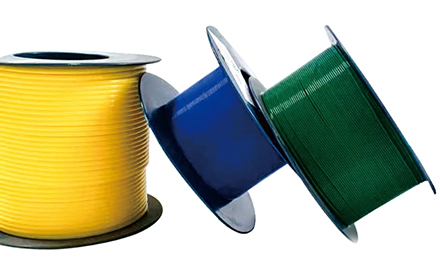PTFE (Polytetrafluoroethylene) is a high-performance polymer known for its exceptional properties, making it one of the most versatile materials across various industries. One of its standout characteristics is its remarkable temperature resistance. PTFE TUBEs, also known as PTFE Tubing, are widely used in environments where extreme temperatures are a concern. These tubes can handle a broad temperature range, from -200°C to +260°C, making them ideal for high-temperature applications in industries such as chemical processing, automotive, aerospace, and electrical systems.

1. Unmatched Temperature Resistance: A Key Feature of PTFE TUBEs
One of the most significant advantages of PTFE tubing is its ability to withstand extreme temperatures without losing its structural integrity. PTFE TUBEs can operate continuously in temperatures as low as -200°C and as high as +260°C. This wide temperature range is far superior to many other materials, including rubber, PVC, and even certain metals.
The inherent properties of PTFE TUBE allow it to maintain its flexibility and mechanical strength in extreme heat or cold. This makes it particularly useful in industries where equipment is exposed to fluctuating or extreme temperatures over time.
For example, in aerospace applications, where components are subjected to harsh conditions, PTFE tubes provide a reliable solution for fuel lines, cooling systems, and hydraulic systems. These tubes can function optimally in both hot and cold environments, making them a trusted material for critical systems.
2. PTFE Tubing in Chemical Processing and Manufacturing
In chemical processing, where high temperatures are often combined with aggressive chemicals, the resilience of PTFE tubing becomes indispensable. PTFE is highly resistant to a wide range of corrosive chemicals and solvents, in addition to its temperature resistance. This makes PTFE TUBE an ideal choice for transporting hot or aggressive fluids, oils, and gases.
For example, PTFE tubing is used in heat exchangers, reactors, and tubing for hot chemical transfer. The tubing ensures that the materials being transferred are unaffected by heat, maintaining their chemical stability throughout the process. Additionally, PTFE tubes will not degrade or leach harmful substances into the materials being transported, which is crucial for food processing, pharmaceutical manufacturing, and petrochemical operations.
3. Automotive and Aerospace Industries: Extreme Temperature Environments
The automotive industry also benefits from the outstanding temperature resistance of PTFE TUBE. PTFE tubing is used in various automotive applications, such as fuel lines, brake lines, cooling systems, and emission control systems. These systems often experience extreme temperatures due to engine heat, exhaust gases, or environmental factors, and PTFE tubes ensure smooth operation without degradation over time.
Similarly, in the aerospace industry, PTFE TUBE plays a critical role in aircraft fuel systems, hydraulic systems, and electrical insulation. The ability of PTFE to withstand high temperatures—such as those experienced during flight—ensures the longevity and reliability of these systems, crucial in maintaining safety and efficiency in aviation operations.
4. High-Temperature Insulation and Electrical Applications
Another area where PTFE tubing excels in high-temperature environments is in the electrical industry. PTFE TUBE is used as a high-performance insulator for wires and cables exposed to high temperatures. Its excellent thermal stability and electrical insulating properties make it an essential material in high-power electrical circuits, wiring for high-frequency applications, and connector cables.
PTFE tubes offer superior protection for sensitive electrical components, ensuring they remain insulated even in the face of temperature extremes. For instance, PTFE tubing is commonly used in power distribution, electric motors, and high-voltage cables, where reliable performance at elevated temperatures is critical.
5. Benefits of Using PTFE Tubes in High-Temperature Applications
Durability: PTFE tubes are durable and long-lasting, even when exposed to extreme heat or cold. Unlike other materials that may degrade or lose strength over time, PTFE tubing maintains its mechanical integrity in the harshest environments.
Flexibility: Despite their ability to resist high temperatures, PTFE TUBE remains flexible, making it easy to install and manipulate in complex systems.
Chemical Resistance: The resistance of PTFE tubing to chemicals and corrosive substances ensures it can handle high-temperature applications involving hazardous or aggressive fluids without breaking down.
Non-Stick Surface: PTFE TUBE has a non-stick surface, which prevents the buildup of residue or contaminants in the tubing, particularly when transporting high-temperature liquids.
Safe for Sensitive Applications: For industries like pharmaceuticals, food processing, and biotechnology, where maintaining the integrity of the transported materials is critical, PTFE tubing ensures that high temperatures won’t compromise the safety or purity of the substance being conveyed.
PTFE tubes are indispensable in high-temperature applications due to their unmatched temperature resistance, chemical stability, and mechanical strength. Whether in chemical processing, aerospace, automotive, electrical, or medical industries, PTFE tubing offers a reliable solution to environments that demand superior performance in the face of extreme heat.





 English
English
